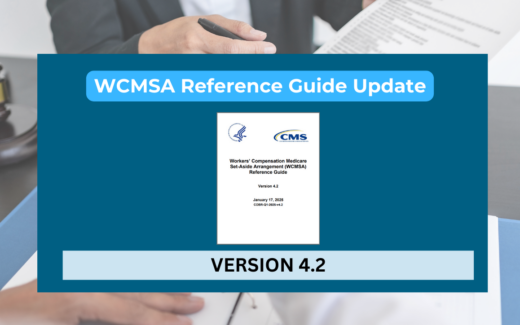On January 17th, the Centers for Medicare and Medicaid Services (CMS) released the WCMSA Reference Guide v4.2 January 2025. These updates introduce important changes to policies and processes for WCMSA submissions, ensuring clarity and compliance with Medicare’s interests. Heres what you need to know about the latest updates outlined in Section 1.1:
- The policy regarding unfunded ($0) WCMSA requests with guidelines was added (Section 4.2).
- Language related to decision guidelines was updated (Section 9.4.3).
- Example calculations for Intrathecal Pump, Spinal Cord Stimulator, and Peripheral Nerve stimulator replacements were corrected (Section 9.4.5)
New Policy for Unfunded ($0) WCMSA Requests
CMS introduced a policy stating that $0 WCMSA proposals will no longer be accepted starting July 17, 2025. If such proposals are considered, they must have strong documentation showing the claimant doesn’t require Medicare-covered treatment for the work-related injury. This policy is designed to prevent situations where Medicare could inadvertently cover costs that should have been addressed by the settlement. While $0 proposals are being phased out, CMS will continue to recover conditional payments for services provided before the settlement date.
Risk of Future CMS Challenges
While the elimination of $0 allocations is a firm policy, there’s an added layer of complexity: the potential for future CMS challenges or policy shifts. Parties proposing $0 WCMSAs should:
- Retain detailed documentation and rationale for why the $0 allocation was appropriate.
- Be prepared to defend the decision if CMS challenges the allocation later.
For instance, CMS could modify its policies within the next six months or even after the settlement is finalized, leaving the parties at risk if the $0 allocation is found insufficient. Maintaining a clear paper trail by including medical reports, settlement documents, and correspondence will be crucial to mitigating this risk.
Cleared Decision Guidelines for WCMSA Reviews
CMS has refined its decision- making process to make it more transparent and consistent. These updates ensure that reviewers thoroughly evaluate:
- Prior injuries and underlying conditions that could impact future care.
- Regional medical pricing and guidelines for accuracy.
- Medical evidence and treatment history provided by the submitter.
This update relies on evidence-based rationale, aligning with medical literature and published guidelines. This ensures that every proposal meets Medicare’s interests while accounting for the claimant’s specific medical needs.
Corrected Device Cost Calculations
Examples for calculating costs and schedules for replacing medical devices (e.g. Intrathecal Pump, Spinal Cord Stimulator, and Peripheral Nerve stimulator replacements) were updated. These changes clarify how to:
- Account for life expectancy and replacement intervals (e.g. every seven years for Intrathecal Pumps.)
- Include associated costs like surgery, anesthesia, and trials for initial placement and replacements.
This ensures that WCMSAs reflect realistic and comprehensive funding for future medical care.
Amended Review Requests No Longer Require a One-Year Waiting Period
Section 16.3 (Amended Review)
Where the following criteria are met, CMS will permit a one-time request for re-review in the form of a submission of a new cover letter, all medical documentation related to the settling injury(s)/body part(s) since the previous submission date, the most recent six months of pharmacy records, a consent to release information, and a summary of expected future care.
What Does This Mean?
Previously, amended review requests could not be submitted until one year after a WCMSA case had been approved. Effective April 7, 2025, this waiting period will be eliminated. Parties will now be able to submit a one-time amendment review request at any time after a WCMSA case is approved. This change is a positive development for settling parties as it eliminates the mandatory one-year delay for requesting a review. When parties disagree with a CMS determination or if there are changes to the claimant’s treatment, they can now act more quickly to resolve the issue. This change is especially useful in cases where treatment plans evolve or where CMS’s original determination may need clarification or adjustment.
______________________
If you’re involved in WCMSA submissions, it’s important to familiarize yourself with these changes. These changes will significantly impact how claims are settled. Proper documentation, accurate cost projections, and adherence to the new guidelines will help ensure smoother approvals and compliance with CMS standards.
Have questions about these updates or need assistance? Please feel free to reach out to our team of experts.



